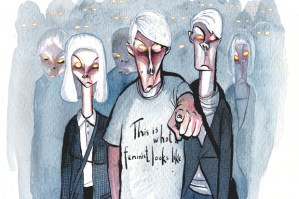Three female students are suing Yale and several campus fraternities for ‘alleged gender discrimination and for fostering a sexually hostile environment,’ reports the Yale Daily News.
The lawsuit fits into a broader, national conversation happening on college campuses around the country about the role of fraternities, sororities, and any on-campus organization that discriminates on the basis of sex. Increasingly, campus activists — and, in the case of Harvard, sometimes college administrators — are calling for single-sex institutions to be forcibly integrated.
I’m biased on this issue, but so are the plaintiffs, whether they recognize it or not. My own educational experiences have been shaped — and deeply enhanced — by single-sex institutions. My time at Barnard, a women’s college, was deeply enriching. It is an experience I feel fortunate to have had, and fervently hope that future generations of women will have the option of having as well. This is not to say that single-sex education, or single-sex social organizations, are optimal for everybody; they are not. It is, however, to acknowledge that a single-sex environment is at times desired by, and beneficial to, some individuals. Students at Yale and other universities should have the option to join either co-ed or single-sex social organizations on campus. The left has historically appreciated more freedom, more flexibility, more choice. Liberals have always advocated the idea that different things work for different people, that minority rights and desires should be protected, that a dominant class should not be able to impose its values or principles on everyone else. And yet those who have called for the destruction of single sex clubs, those who have sought to delegitimize them, or regulate them out of existence, are guilty of precisely that crime.
The Yale lawsuit is fascinating in its predictability. The three Yale women — and their legal representatives — have grounded their arguments in familiar tropes and accusations. The lawsuit alleges:
‘When Ms McNeil, Ms Singer, and Ms Walker [the plaintiffs] arrived on campus as first-year students, they encountered a thriving all-male fraternity scene. Yale had a drastic shortage of University-run social spaces, and the fraternities (“Defendant Fraternities” or “the Fraternities”) were the de facto social environment for many students. Male students routinely controlled the admission, alcohol, lighting, and music for many Yale social gatherings. This dynamic created dangerous environments in which sexual misconduct thrived.’


















